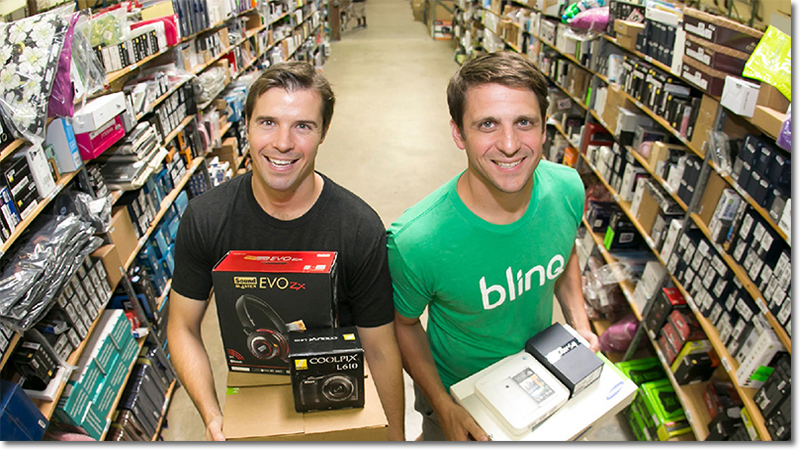Optoro’s Sustainable Reverse Logistics Platform

Washington, DC based Optoro offers a reverse logistics platform that retailers can use to manage, process, and sell customer return and excess inventory with the goal of making retailers more sustainable and reducing their environmental impact.
The retail industry is not, as a whole, a very sustainable one.
Think of all the products that get returned that are not re-sellable.
Much of this returned inventory gets shipped to landfills.
You can’t completely blame the retailers for this, because their primary goals are to be profitable and hopefully provide good customer service (which in a lot of cases, means a very flexible return policy).
Rather than find alternate destinations for unsellable returns, it’s cheaper and easier to throw most of it out. Of the inventory that can be re-sold, rather than save money, retailers often end up spending more money to get rid of the inventory.
Washington, DC based Optoro offers a reverse logistics platform that retailers can use to manage, process, and sell customer return and excess inventory with the goal of making retailers more sustainable and reducing their environmental impact. They offer multiple services and platforms to retailers (such as Blinq, their retail site) to help get rid of excess inventory in the most efficient, cost-effective, and environmentally sound way.
I had a chance to talk with Co-Founder and CEO Tobin Moore about Optoro’s products and services, the company’s core values, and what it’s like starting up in DC.

How is Optoro working to make the retail industry more sustainable?
There’s a lot of waste and depreciation that happens with products on their way from the retailer to some wholesaler or re-seller which could be on the other side of the country. There’s also no thought given to the environmental impact of throwing out the bad stuff.
“Our solution cuts out all the middlemen, all the redundant shipments and the wasted Co2 and gas that goes into that. It keeps all these product out of landfills, and it connects the products to the people who want to re-use them, directly from the source.”
Optoro has recently hired a Director of Sustainability who used to work for the EPA. She has conducted environmental impact studies on the waste that is created by inefficient reverse logistic supply chains and how Optoro’s solutions could eventually disrupt these supply chains so much that it would be the equivalent of taking several million car’s worth of Co2 pollution per year off the roads.
How do you set yourselves apart from your competitors?
“People don’t offer these platforms that we do. They’re mainly these old school liquidators who want you to physically send them the goods, to process and manage them, and then they flip it through these middleman networks, says Moore. “We cut out the middleman. We’re basically disrupting the old way of doing things.”
The retail clients are already using software to manage their reverse logistics, but with Optiturn, Optoro’s unique cloud-based software, the process can be greatly streamlined by connecting end consumers, rather than having to go through a series of middlemen.
What is important to your company’s culture?
“It’s a culture where everyone is encouraged to be very collaborative, and innovative, and constantly push new ideas. We do have some of the gritty scrappiness to us still from being a startup that was bootstrapped for so long… We really did whatever we could to save money, but at the same time we never gave up on whatever the solution was. So we’ve maintained that mentality of doing whatever it takes to solve a problem.”
Moore goes on to describe the team at Optoro as a group of people who like tackling big challenges. They’re also a company that likes to give back to the community. For example, they recently participated in Earth Day by helping out with the Neighborhood Farm Initiative.
Optoro has grown a lot since they first bootstrapped their way up in DC. They’ve received funding and support from Steve Case’s Revolution Growth and founders Tobin Moore and Adam Vitarello were recently named among 2015’s Tech Titans by Washingtonian Magazine.
Source: Tech.Co
Related: Reverse Logistics - 5 Steps for Better Backward Operations

Article Topics
Optoro News & Resources
Holiday Season Heightens Challenges of Online Returns for Retail Supply Chains Modernizing Supply Chains Critical to Operational Efficiencies & Global Competitiveness UPS Invests in Reverse Logistics Specialist Optoro Reverse Lifecycle Management: The Next Opportunity in Reverse Logistics Managing Reverse Logistics to Improve Supply Chain Efficiency and Reduce Cost Optoro’s Sustainable Reverse Logistics PlatformLatest in Transportation
Nissan Channels Tesla With Its Latest Manufacturing Process Why are Diesel Prices Climbing Back Over $4 a Gallon? Luxury Car Brands in Limbo After Chinese Company Violates Labor Laws The Three Biggest Challenges Facing Shippers and Carriers in 2024 Supply Chain Stability Index: “Tremendous Improvement” in 2023 Trucking Association CEO on New Biden Policy: ‘Entirely Unachievable’ Two Weeks After Baltimore, Another Cargo Ship Loses Power By Bridge More Transportation












